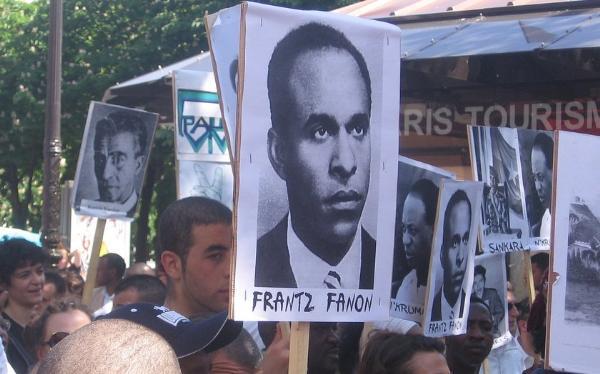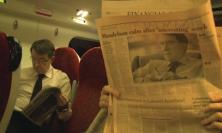Zimbabwe’s President Robert Mugabe is preparing to be re-elected unopposed after the opposition’s withdrawal from the election, amid reports of widespread violence and intimidation. The situation in Zimbabwe, however, was being foretold as long as fifty years ago by the writer Frantz Fanon, whose theories about the end of colonialism have proved remarkably prophetic, argues Marcel Uwineza, a Jesuit of the Rwanda-Burundi Province.
Experts are people who have the capacity to foresee the future effects of present causes and because of this, they remain relevant for all ages. (Plato, 190a)
Introduction
For students of various fields of inquiry, it may be easy to point out the thoughts of important personalities in their fields of study. But it requires some creative thinking and ingenuity to explain how and why someone’s thoughts are relevant or irrelevant to a certain epoch or to our times. The scope of this article is to demonstrate critically, and with examples, the relevance of Frantz Fanon (1925-1961) to contemporary African politics, especially as regards Zimbabwe. Nevertheless, the article neither vindicates nor opposes ruling parties in African politics nor their opposition. It is about Fanon’s prophetic words being fulfilled today in many parts of Africa. The aim here is to highlight the hidden relevance, treasure, and expertise of Fanon for everyone involved in leadership in Africa.
Fanon’s deep commitment
Fanon’s works: The Black Skin, White Masks (1952), A Dying Colonialism (1959), The Wretched of the Earth (1961), Towards the African Revolution (1964), and other essays such as “Vision of the Postcolonial State” and “Philosophical Reflections about Continental Africa” profoundly influenced 20th century thinking about the image and value of the person, decolonization, violence in Third World countries, the problematic post-independence African states, and nationalism and national consciousness. In A Companion to the Philosophers, Taiwo states that Fanon’s works influenced many African thinkers after independence, especially those interested in renewing the image and understanding of leadership in Africa. “It is not surprising to see how writers such as Ngugi wa Thiong’o, Chinua Achebe, Wole Soyinka and others used some of Fanon’s ideas to critique leadership in post-independence Africa” (Taiwo 13). Fanon’s works confirm his dedication to the cause of freedom and his selfless drive to liberate human beings wherever they may be.
Fanon was a deeply committed person. Despite his growing disease – leukemia – he worked inexorably and redoubled his efforts. He said: “I will not cease my activities while Algeria and Africa in general still continue the struggle and I will go on with my task until my dying day” (quoted in Macey 4). For him, the state of emergency in which we live is not an exception but a rule. It demands that everyone commit themselves to appreciating anew the lost value of every person, especially people of colour. Fanon holds that the future will have no pity for those who, “possessing the exceptional privilege of being able to speak words of truth to their oppressors, have taken refuge in an attitude of passivity, of mute indifference, and of cold complicity” (Toward 102).[1] His attitude is that of the philosopher king whose sole interest revolves around the ‘we’, the quest for the truth, for the meaning of life and how to make life meaningful and liveable for others.
For Fanon, wherever one may be, one should be aware that people must unite their efforts in order to deal the deathblow to Africa’s problems. He writes: “We must all of us together, dig the grave in which the politics of terror will finally be entombed” (119). He believes that if one is to live or die, one should do so for a cause. “What I want to tell you is that death is always with us and what matters is not to know whether we can escape it but whether we have achieved the maximum for the ideas we have made our own”[2] (qtd in Kiros 217). We are nothing on earth if we are not slaves to a cause, the cause of the people and the cause of justice, liberty and free ideas that are made available to all. Fanon is convinced that one must even accept the risk of death to bring freedom to birth (Toward 95).[3] This is the kind of person that Africa needs today to deal with its problems of grinding poverty, greed and corruption, rampant unemployment, poor nutrition, destructive sexual abuse, and so many others. This commitment demands that one transcend the philosophy of ‘having’, which alienates people from seeing the reality around them, to promote the philosophy of ‘being’ where the intrinsic value of a person is the only thing that matters.
Fanon’s prophetic words about postcolonial African states
If one analyses Fanon’s writings on African politics, one is likely to view him as a prophetic figure who foretells the failures of leadership in some African states. There are many factors that Fanon highlights with regard to leadership failure, ranging from the activities of ruling parties to those of the heads of states. Because of their failures and lack of accountability, ruling parties and heads of states threaten the people and frequently remind them of the need for silence. Instead of welcoming expressions of popular discontent, instead of taking the free flows of ideas from the people to the government as its fundamental purpose, the ruling party forms a screen and forbids such ideas. Zimbabwe’s ruling party, ZANU PF[4], is a case in point. Many will agree that when ZANU PF politicians talk about the problems affecting Zimbabwe today, they refer to the past. People are taken back to the past as if there is no present and future to look to. This is what Fanon calls exhausted nationalism. Let him speak:
The ruling party in many parts of Africa […] is puffed up in a most dangerous way. In the presence of a member of the party, the people are silent, behave like a flock of sheep and publish panegyrics in praise of the government of the leader. But in the streets when evening comes, away from the village, in the cafés or by the river, the bitter disappointment of the people, their despair but also their unceasing anger makes itself heard. (The Wretched 147).
This is no different to the “laager mentality” that Dr David Kaulemu referred to in his public lecture at Arrupe College, Harare on 23rd October 2006. This mentality excludes part of the population from participating fully in the country’s affairs. For instance, in Zimbabwe, some people had their passports burned because they did not support the ruling party. Fanon remarks that the leader, because he refuses to disintegrate the national bourgeoisie, asks the people to fall back on the past and to become drunk on the remembrance of the epoch which led up to independence. He writes: “During the struggle for liberation the leader awakened the people and promised them a forward march, heroic and unmitigated. Today, he uses every means to put them to sleep, and three or four times a year, asks them to remember the colonial period and to look back on the long way they have come since then” (The Wretched 135-6). It is unfortunate that this is happening today in Zimbabwe. Presidential election results have been delayed because since 1980, the ruling party has feared that it may lose power. One day, an old woman asked one of the ministers: “Please Mr. Minister, when will this independence come to an end?” (Kaulemu 84) Perhaps she was tired of hearing the songs and speeches of independence incessantly, while she was starving at home. I believe she is not the only one in this predicament. Fanon is against exhausted nationalism like that of ZANU PF, which alienates people from seeing the reality around them to avoid dealing with their problems in concrete ways.
The progressive transformation of the party into an Intelligence Service is a telling indication that the government is more and more on the defensive. “The incoherent mass of the people is seen as a blind force that must be continually held in check either by mystification or by fear instilled by the police force” (The Wretched 150). This is due to the party’s failure or its inability to separate its affairs from those of the government. By being on the defensive, the party and its leader limit or block any possible dialogue with their opponents so as to remain feared and unchallenged. This is why Harold-Barry says “we are in one country, “two nations, and there is no dialogue” (249). One is inclined to say that President Mugabe’s paranoid attitude towards the opposition party and the international community is due to his failure to address the different crises that the country is facing today.[5] Mugabe’s government has instituted a massive propaganda drive, which has refused dialogue at all sectors of political and social life, both within and outside the country.
Due to its failure to bring about economic prosperity and a balanced system of governance in which the masses have the right to raise their concerns, the government uses the army and the police to instil fear within the populace. “The army and the police constitute the pillars of the regime. The strength of the police force and the power of the army are proportionate to the stagnation in which the rest of the nation is sunk” (The Wretched 146). The party is given the task of supervising the masses. It controls the masses, not in order to make sure that they really participate in the business of governing the nation, but to remind them constantly that the government expects blind obedience and discipline from them.
Were he to come to Zimbabwe today and see how the police instils fear within the populace, Fanon would identify what he said back in the fifties. The police and the army constitute the pillar of Mugabe’s administration. This is clear if one analyses how the operations Gukurahundi and Murambatsvina were carried out by these forces in recent years and months.[6] Fanon’s prophecy is being fulfilled. The ZANU PF party makes sure Zimbabweans are constantly reminded that the regime expects obedience and discipline. Fanon says: “When the masses raise their voice after realizing that they have made sacrifice for change and nothing has changed, the torture machine of the dysfunctional state is mobilized against them” (quoted in Sekyi-Otu 171). In Zimbabwe, before uttering even one word against ZANU PF, one has to ensure there is no one to report it. The recent development with emails, which are screened by Mugabe’s government, is an example of what I am talking about.
For Fanon, the ruling party, which used to call itself the servant of the people, which used to claim that it works for the full expression of the people’s will, secretly organizes an ethnic dictatorship. The ministers, the president’s cabinet, the ambassadors, local commissioners and the high ranking soldiers are chosen from the same ethnic group as the leader, sometimes directly from his own family. The children of the beloved members of the party are the ones who get better places for education abroad (The Wretched 147).[7]
Before independence, Mugabe was trusted as a true revolutionary leader and indeed he fought to restore the dignity of black Zimbabweans. Yet today he is a dictator.[8] This is prophesied by Fanon, who said: “Before independence the leader generally embodies the aspirations of the people for independence, political liberty and national dignity” (ibid). Yet soon after independence is declared, far from embodying in concrete form the needs of the people in what touches bread, land and the restoration of the country to the sacred hands of the people, the leader reveals his inner purpose, that is, to become the general president of the company of profiteers impatient for their returns which constitutes the national bourgeoisie (The Wretched 149). This type of head of government is the true traitor in Africa. Take the Democratic Republic of Congo as an example. President Mobutu became the true traitor of his own people, a profiteer president whose sole interest was to accumulate wealth at the expense of the people he claimed to represent. Yet Mobutu is just one among many in Africa.
A country in a dilemma: Who will replace President Mugabe?
It is amazing how Fanon’s views depict the uncertainty felt in Zimbabwe today when the question of who will replace Mugabe arises. A book has been written, What Happens after Mugabe, yet the answers are far from clear. It took five weeks from the 29 March to officially publish the presidential results. The country remains at an impasse and today uncertainty has arisen as to what will happen now that the opposition has withdrawn from the run-off in the presidential election. Fanon prophesies: “We may understand the panic caused in governmental circles each time the leader falls ill; the members of his party are obsessed by the question of who is to succeed him. What will happen to the country if the leader disappears or dies?” (The Wretched 148) The ruling class, whose members support the leader – irresponsible, indifferent, and essentially preoccupied with the pleasures of everyday life and their journeys paid for by government money – is left in a quandary. It does not know what to do after its leader is gone. There has been a fusion between the state and its leader, between the party and the state, which is wrong. The leader considers himself as the father of the nation. He is unchallenged and if an attempt is made to challenge him, those involved are kidnapped or accused of treason. The leader of Zimbabwe’s opposition party, Morgan Tsvangirai, was charged with treason in 2002. The same happened in Uganda when Museveni accused his opponent Kiiza Besigye. The reason for this is to confuse the masses before elections.
Fanon foretells that in many countries, opposition parties – which are usually progressive and tend to work for the greater influence of the masses in public affairs, desiring that the proud, money-making bourgeoisie be brought to heel – are by baton charges and prisons, condemned first to silence and then to a clandestine existence (The Wretched 151). This is what happened in Zimbabwe. Since there is no free press in Zimbabwe, it seems almost impossible for the opposition party to emerge from the silence that the ruling party has imposed on it. How can the population know the opposition and its agenda if ZANU PF monitors or censors everything we hear on the one television channel, the one radio station and the one state-run newspaper, The Herald? Fanon’s prophecy on this point is accurate. However, Fanon also warns opposition parties! He says these parties sometimes do not have feasible political agendas. They do not know how to achieve what they are fighting for. This is a challenge to multi-partyism in African politics; often those who constitute opposition parties switch allegiance as easily as people change from one “matatu” (i.e. public bus) to another.
What kind of leadership does Fanon suggest?
Fanon suggests a responsible political party, which is not a tool in the hands of the government. The government ought to be a tool in the hands of the people. It is the people who should decide on the policy that the government carries out. The party is not, and ought not to be, the only political bureau where all the members of the government and the chief dignitaries of the regime meet freely together. “If the party is mingled with the government, the fact of being a party militant means that you take the short cut to gain private ends, to hold a post in the government, set up the ladder, get promotion and make a career for yourself” (The Wretched 148-9). Put simply, what Fanon is suggesting is that nobody can govern without the consent of the governed. African governments ought to listen to the people they represent. Fanon proposes a decentralized or participative form of leadership in which people feel that they are not cheated. For him, the government is not an administration responsible for transmitting government orders; it is the energetic spokesman and incorruptible defender of the masses. The ruling class ought to be in contact with the people to see the extreme, ineffable poverty of the people and to awaken people’s intelligence and the onward progress of their consciousness. Fanon goes even further to say that a leader should stay with his people, not in some secluded chateau where he can hardly know the real life of those he leads. Fanon believes that if the national government desires to be national, it ought to be governed by the people and for the people, for the outcasts and by the outcasts (Lazarus 167). This is a participative democracy. No leader, however valuable he may be, can substitute himself for the popular will and national government. Before thinking about international prestige, he ought to restore dignity to all citizens.
A critique and conclusion
At the end of The Wretched of the Earth, he suggests that one of the ways in which Africa may develop is through invention and technology. Fanon exhorts Africans to combine their efforts to create a new world and a new humanism, “which Europe has been incapable of bringing to triumphant birth” (The Wretched 252). Fanon indeed encourages African intellectuals to discover fresh thinking on how to deal with their problems. This is praiseworthy. Nevertheless, being a man of his time, Fanon’s prophecy fails to foresee that in our current era, whether one likes it or not, one has to join the globalisation game. In the global economy, one is not determined by what one is, or by one’s humanity, but what one contributes to the market. Africa has limited choices. It has to dance to the globalisation song where the winner generally takes all.
Fanon also assumes that the masses are educated enough to know their rights. Yet this is not correct, considering that part of the problem facing some of Africa today is a lack of the proper and pragmatic education that can empower the population to solve its problems. I was recently shocked to hear from Fr Silas, a diocesan priest from Meru diocese, Kenya, that in some parts of Meru, if a woman is raped and goes to complain to the authorities, some women will ask: what is wrong with that woman, doesn’t she know that it is the right of men to enjoy sex? However, Africa’s leadership failure cannot be blamed on Africans alone. External influences have played a big role – another area where Fanon’s thoughts are relevant to our African politics.
This article has attempted to show Fanon’s expertise or prophecy, confirming Plato’s assertion: “Experts are people who have the capacity to foresee the future effects of present causes and because of this, they remain relevant for all ages.” I hope that some possible misconceptions about Fanon have been corrected. We can thus say that someone’s relevance does not depend on their age.[9] It does not always matter how short or long one’s life has been, as Ignatius of Loyola would say. What matters is whether one has accomplished the cause one set for oneself. Indeed part of us will be remembered because of the quality of life we lived and the ideas we put across.
Marcel Uwineza SJ is a Jesuit scholastic working at the African Jesuit AIDS Network in Nairobi. He lived in Zimbabwe from 2003 to 2007.
[1] In this article, where I quote Fanon’s primary texts, which are more than one, I will use the first word of the title of his book to avoid confusion. I do not intent to give Fanon’s biography since this can easily be obtained on the internet. The desire to write this paper came recently after reading Fanon’s writings and living in Zimbabwe for four years from 2003 to 2007.
[2] He said this in a letter to his friend Roger. However, it is relevant for all those who are committed to finding solutions to Africa’s problems that they do so looking first not at their own gains but those of all the people, even if it takes years to achieve.
[3] It should be clear that Fanon is not calling for martyrdom for its own sake. Death is not a prerequisite for freedom. However, Fanon believes that if it means that in the last resort some blood be shed for a noble cause, then there is nothing wrong about it. In this case, death does not degrade the value of the person, it increases this value. This is like saying that if the grain of wheat does not fall into the ground and germinate, it bears no fruits. Thus Fanon’s thinking can help some of our leaders realise that we could achieve freedom and peace without necessarily losing people’s lives. Nevertheless, some of them do not share this line of thinking. Once one considers oneself a “life president”, then it matters less what the people say.
[4] Zimbabwe African National Unity Patriotic Front.
[5] One should not take me to mean that the opposition party MDC (Movement for Democratic Change) is better in itself. It has its own ideologies too which need to be discussed. However, this is not the purpose of this article. The idea is that dialogue in any given society is an important tool in solving its problems and this is what Mugabe’s regime seems undoubtedly to have refused to do.
[6] Gukurahundi is a Shonaterm that means getting rid of the chaff. It was the name given to an operation, almost equivalent to genocide, carried out against the Ndebele people in Matabeleland from 1980 to 1987, which saw thousands of Ndebele killed. This is in many ways similar to what happened in Rwanda in 1994.
Operation Murambatsvina was a recent operation (in 2005) that saw many houses (especially in the high-density suburbs in all towns across the country) destroyed on the pretext that they were built illegally. However, some analysts argue that the government’s hidden agenda was to reduce the population in towns, where awareness was increasing of the failures of Mugabe’s regime. Hence these people were sent back to the rural areas where they had little access to information.
[7] I must say that this is largely true for many African countries, hence needless to mention any particular country.
[8] Surely some people may say that Mugabe is a hero for some Zimbabweans. Yet it takes a critical analysis of the reality around us to see that those who support Mugabe tend to do so either because they know that they are benefitting from his regime or because they are relatively uneducated and think that Mugabe is The Only President. I would not be surprised if there were a part of the population that thought all presidents were “Mugabe.”
[9] Remember that Fanon died at the age of 36. Some of us are already reaching or have passed that age. The question is have we accomplished something? Are we really ‘slaves’ of a just cause for our people?






